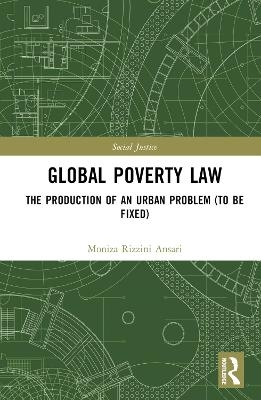
Global Poverty Law
Routledge (Verlag)
978-1-032-22682-8 (ISBN)
Urban poverty has been widely examined as a social problem that requires attention and social commitment. Law is often seen as both an important contributor to the problem as well as a source of crucial tools to overcome it. In spite of this, however, poverty is surprisingly disregarded within legal scholarship. This book counters this by drawing on legal theory, legal history, and legal geography to inquire how urban poverty is made visible and invisible as a problem across global cities. More specifically, it investigates the mechanisms and networks through which global urban poverty has been conceptually and materially shaped in a way that fits the remit of global corporate philanthropy and the development aid agenda. By following law’s circuitous interactions with poverty knowledge and antipoverty interventions, the book demonstrates how it plays a historical role in making poverty seen, known, and remedied. As a result, the book argues, law consolidates a stable image of poverty as an essential ‘problem’ – to be uniformly found worldwide and so reasonably fixable with the appropriate legal reforms. Taking poverty to be a fundamental manifestation of social injustice, the book thus raises key questions about the role of law in the achievement of social justice.
This innovative and insightful account of the relationship between law and poverty will appeal to scholars in critical and socio-legal studies, as well as others working in poverty studies, urban studies, development studies, geography, sociology, and social policy.
Moniza Rizzini Ansari is Human Rights Lawyer and Researcher at the Federal University of Rio de Janeiro, Brazil (FAPERJ, PDN10).
Introduction: Seeing Poverty and Fixing It: The Antipodal Perspective of ‘Global’ Poverty Aid Part 1: Framing Social Injustice in the Urban World 1: The Visual Economy of Global Poverty: an Urban Problem To Be Fixed by the Law 2: Advancing a Legal-Aesthetic Framework to Investigate the Global Geographies of Urban Poverty Part 2: A Legal History of Poverty's Production as an Urban Problem 3: Isolating an Urban Problem: Territorial Containment of the Poor To Be Saved 4: Modulating a Global Problem: Targeting the Poorest Populations to Save Themselves Part 3: Global Patterns of Aid and Local Practices of Poverty Demarcation 5: Data Governance: Poverty Formalization and the Grounds of Urban Informality 6: Global Poverty Law: The Things Lawyers Do that Create the Stable Imagery of Urban Poverty. Conclusion: The Ethics and Praxis of Poverty Lawyering in Times of Global Urbanity
| Erscheinungsdatum | 22.08.2024 |
|---|---|
| Reihe/Serie | Social Justice |
| Zusatzinfo | 1 Tables, black and white; 3 Line drawings, black and white; 5 Halftones, black and white; 8 Illustrations, black and white |
| Verlagsort | London |
| Sprache | englisch |
| Maße | 156 x 234 mm |
| Gewicht | 644 g |
| Themenwelt | Recht / Steuern ► Allgemeines / Lexika |
| Recht / Steuern ► EU / Internationales Recht | |
| Recht / Steuern ► Privatrecht / Bürgerliches Recht ► Baurecht (privat) | |
| Sozialwissenschaften ► Soziologie ► Spezielle Soziologien | |
| ISBN-10 | 1-032-22682-X / 103222682X |
| ISBN-13 | 978-1-032-22682-8 / 9781032226828 |
| Zustand | Neuware |
| Informationen gemäß Produktsicherheitsverordnung (GPSR) | |
| Haben Sie eine Frage zum Produkt? |
aus dem Bereich


